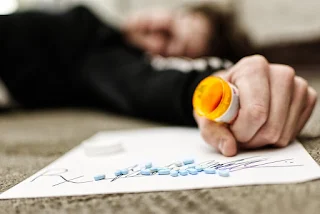Overview Of Drug Poisoning
Drug poisoning is very common and can happen at any time. It also happen at home or in the hospital. It is due to errors from prescriber, dispenser and user.
Drug is a substance that can change body physiological behaviour. The level of this change depends on the quantity that gets into the body and duration of exposure. There are different ways drugs can be used. From the skin and through injection and oral.
 |
| Drug poison |
There is a general saying that says that all drugs are poison. This includes paracetamol. That is true to some extent. A poison is a substance that harms the body. Every drug becomes a poison at a certain dose. That is why drug poisoning is defined as the exposure to a dangerous amount of a drug that can cost harm.
Read Also: Treating head lice with sniper insecticide is dangerous
The higher the quantity that gets into the body or the longer the exposure time coupled with the person's physical and medical history will determine how much of a poison it is. Poisoning happens when the body is not able to metabolize or detoxify the drug fast enough to avoid overdose.
Drug poisoning is very common in the world today. In 2014, the United States of America (USA) recorded about 47050 drug overdose deaths. It is common among children below five years. This is because they are more curious to put everything they come across in their mouth. Adults below 39 years of age who want to try hard drugs or suicidal ideation also count among vulnerable groups. Elderly people with multiple drugs may mistakenly take the wrong drugs at the wrong dose. Lastly, drug addicts who are always on the lookout for new drugs to abuse may find themselves experimental guinea pigs with drug poisoning.
Type Of Drug Poisoning
There are two types of drug poisoning. They are accidental and intentional. Accidental drug poisoning occurs when a person takes in a drug not knowing it is exceeding his therapeutic range. This happens when a person takes a wrong drug, wrong dosage or taking the right dose but too frequently.
Intentional drop poisoning or call when a person deliberately takes a particular job approves therapeutic dose. It is common among suicide victims a drug addict who deliberately wants to get high.
There is another set of drug poisoning where a person is very sensitive to a drug at the lower end of the therapeutic range. It becomes poisonous for them even at the normal dose.
Signs Of Drug Poisoning
The major sign of drug poisoning is the elevated side effects of the drug. This is in addition to other serious effects. For example, nausea and vomiting are the side effects of many drugs that are not very pronounced at normal therapeutic doses. It becomes noticeable at high doses.
Read Also: Sniper insecticide poisoning treatment
Dangerous effects include trouble breathing, loss of consciousness, difficulty walking, agitation, violence, enlarged pupils, tremors, convulsions, hallucination or delusion.
Common Drug Poisoning
There are hundreds of drug cases. However, paracetamol and aspirin remain the most common drug. The reason is that many people think that these over the counter (OTC) drugs are harmless even at high doses. So many people take them when they are not feeling too well as a way of self medication. Signs of paracetamol poison include jaundice, hypoglycemia and loss of coordination. Aspirin on the other hand leads to sweating, rapid breathing, tinnitus and temporary hearing loss.
Treatment
Treatment is easy when the drug is known. Not all drug poisoning have antidote. Treatment is to clear the airway. Activated charcoal work for many drug poison. Induce vomiting only when certain the drug is not acidic. Large intravenous fluids help speed up the body removal of the substance. Antidote for poisoning with known solution.

Comments
Post a Comment
Please have your say